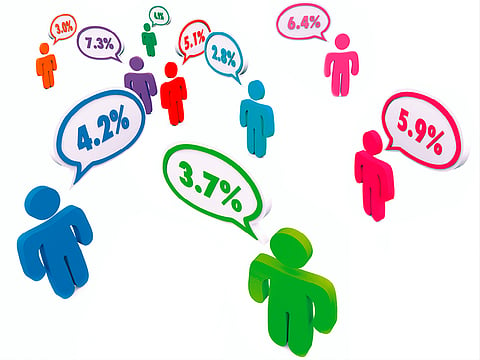Fundamentals of UAE mortgage products
The key criteria of home financing from a borrower’s perspective

Everyone dreams of living in their own house. But realising such a dream is never quite easy, so most people turn to bank loans to buy their dream homes. With over 15 of the leading retail banks offering home financing, how does one arrive at the best choice? A quick way to compare mortgage products is to use online comparison sites such as Mymoneysouq, Souqalmal and Yallacompare.
Banks have multiple mortgage products and the deals would differ depending on certain criteria, such as a borrower’s citizenship, borrowing history, the flexibility of the interest rate over the term of the loan or whether a customer’s salary is transferred to the lending bank.
As Ambareen Musa from Souqalmal points out, “The home finance market in the UAE is very competitive, with over 50 banks and finance companies competing for a share of 9 million residents — not nearly as big as many other banking markets.”
So borrowers will have to look closely to find the most suitable mortgage product for them. This article aims to provide a high-level comparison of the multiple products available by the key criteria from a borrower perspective.
Minimum income
Banks adhere to a minimum monthly income to qualify a customer for a home loan. The maximum loan amount can be 50-90 times the monthly income. The minimum salary for a home loan can be around Dh10,000-Dh20,000, depending on the bank and the borrower’s citizenship.
“The average minimum salary requirement of all banks in the UAE is Dh17,000, varying from Dh7,000 to Dh40,000,” says Shiv Kumar Gupta, director and co-founder of Mymoneysouq.
Interest rates and profit rates
Interest rates are determined by the Emirates Interbank Offered Rate (EIBOR). Few banks charge a fixed rate for one to two years and then convert to an adjustable rate. The reducing rates range from 2.5-8 per cent, with the majority of banks charging near the 3 per cent mark on a reducing balance.
As Musa notes, “More banks are willing to match the home finance rates offered by their competitors. Based on a recent investigation of the cost of home finance in the UAE, we found that the average starting profit rate of Islamic home finance products was 4.4 per cent, only marginally higher than that of conventional mortgage products (4.2 per cent).”
Down payment
Mymoneysouq analysis shows that 90 per cent of the products provide 70-80 per cent of the property value as a loan, with the rest paid as equity by the borrower. Few banks provide as much as 50 per cent of the property value for specific projects and citizens. The thresholds are, however, clearly regulated by the UAE Central Bank.
Maximum finance
A third of the banks provide maximum finance of Dh10 million. In very special cases, loans of up to Dh50 million are also advertised. The disbursed loan amount is highly subjective based on borrower demographic, existing debt burden and the property valuation.
With such high degree of personal variance, it is advised to make a thorough analysis or appoint a mortgage broker who can guide borrowers through the multiple banks and products to choose from.
Comparing UAE home loans
To review the home finance offers from several lending banks, we consider a property value of Dh1.3 million, the average real estate transaction for residential apartments, and see how the total loan amount, down payment, interest rates and other key parameters vary with each bank’s publicly available home finance product. We have undertaken this study in partnership with Mymoneysouq.
Given the level of complexity, this article aims to share a high-level synopsis from a borrower’s perspective. As this is an indicative review, the final product offered by banks will vary significantly and this analysis should not be considered as an authority; this is an indicative analysis to guide borrowers on the intricacies of picking a mortgage product. Borrowers must borrow within their budget and ensure a full review beyond just interest rates to choose a final lending bank.
As Shiv Gupta, director and co-founder of Mymoneysouq, shares, “Average down payment expected by the banks in the UAE is 26 per cent of the home loan amount – it varies from 20 per cent to maximum of 50 per cent.” It is essential that the minimum down payment requirement is included in the analysis.
Nikhil Rastogi, co-founder of Mymoneysouq, points out that 70 per cent of banks in the UAE provide home loans with an interest rate of 3.25-4 per cent. The interest or profit rates can vary too.
“Close to two-third [64 per cent] of the home finance products listed on the platform are Islamic products,” says Ambareen Musa of Souqalmal. “The number of Sharia-compliant home finance options in the market has gone up substantially, considering that these only made up 47 per cent of the combined category two years back. Potential borrowers now have a wider variety of Islamic products to choose from.”
Islamic banks charge profit rates, whereas conventional banks charge an interest rate. Some property projects may be approved by one bank but not another. Banks are also bound by Central Bank requirements on maximum limits of exposure a bank can carry. These are to be kept in mind when analysing the many products in the market.
Musa further states, “Muslims and non-Muslims alike are looking to take advantage of competitive rates, lower processing fees and more advantageous terms irrespective of the underlying principle behind a finance product.”
With these competitive developments, mortgage portfolios at banks are likely to face stiff headwinds, especially given the excessive residential supply expected in the next few years. Hopefully, the World Expo 2020 build-up will result in a population inflow that will provide the required demand for housing and mortgages.



